Croda Lubricants
Leading the way naturally
By Suresh Swaminathan, Sales Development Specialist, Croda Lubricants | TLT CMF Plus November 2012
At
Croda, we strive to develop new and innovative products which will enable our customers to develop formulations that can deliver tangible benefits to their customers.
Croda products are targeted to add value in the following areas:
•
Improved fuel economy
•
Reduced emissions
•
Improved equipment durability
•
Increase production efficiency
•
Achieve sustainability objectives
Croda’s proven technology platform strengths include:
•
Ester technology, including multi-functional esters (Priolube™)
•
Specialty effect additives (Perfad™, Crodacor™, Crodazoline™ and Crodasinic™)
•
Polymeric surfactants (Hypermer™)
•
Self-emulsifying surfactants combining lubrication and emulsification into one product
•
Polyalkylene glycols (Emkarox™)
•
Polymerized fatty acids (Prisorine™, Pripol™)
Through our application expertise, Croda utilizes its technology platforms to tackle the lubrication needs of today and the performance and legislative targets of the future.
Improved seal conditioning without phthalates
Croda continues to innovate in the area of specialty esters for high performance lubricants. In 2012, Croda launched a new seal conditioning additive, Perfad 5000. Perfad 5000 is a bio-based seal swell ester that provides equal or better performance to phthalate esters. Perfad 5000 is made from 100% biobased raw materials derived from plant and animal sources and is 100% biodegradable (OECD 301B).
To evaluate the efficacy of Perfad 5000, a modified ASTM D7216 test for determining automotive engine oil com patibility with typical seal elastomers was conducted. The test was run on nitrile rubber, (HBNR-1), fluorelastomer (Viton, FKM-1) and polyacrylate rubber seals (AMC-1) for 355 hours at 150°C. Perfad 5000 was tested in PAO 4 against phthalates at varying treat-rates.
Figure 1 shows the weight change results from the D7216 test. Neat PAO 4 reduced the weight of the rubber seals by 4.5%. The lowest molecular weight ester, C6-phthalate, performed the best; however, its high volatility and low flash point limit its utility. Perfad 5000 performs better than both C8-phthalate and C12-phthalate at similar concentrations.
Figure 2 shows the results on Viton rubber (FKM-1). Perfad 5000 was more effective than all three phthalates at swelling Viton.
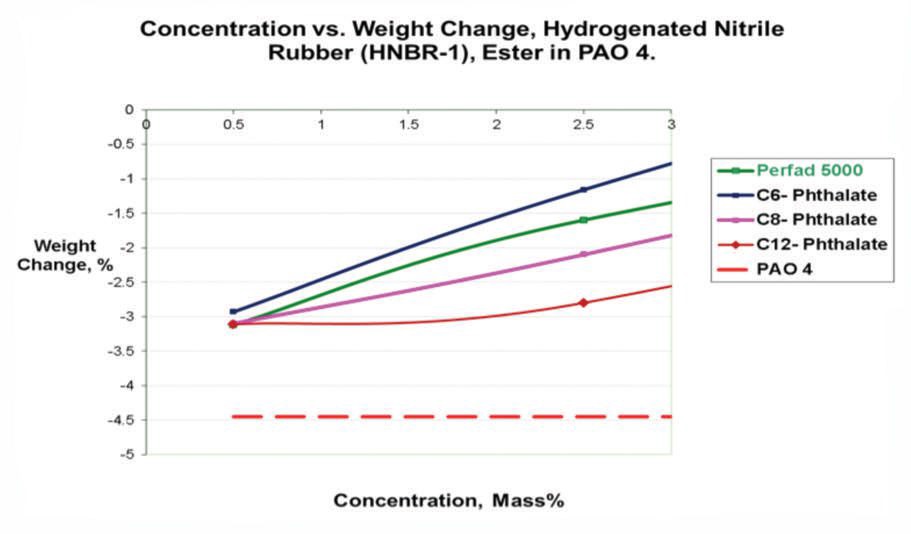 Figure 1. Concentration of Perfad 5000 in PAO 4 vs. weight change of nitrile rubber compared to phthalate esters.
Figure 1. Concentration of Perfad 5000 in PAO 4 vs. weight change of nitrile rubber compared to phthalate esters.
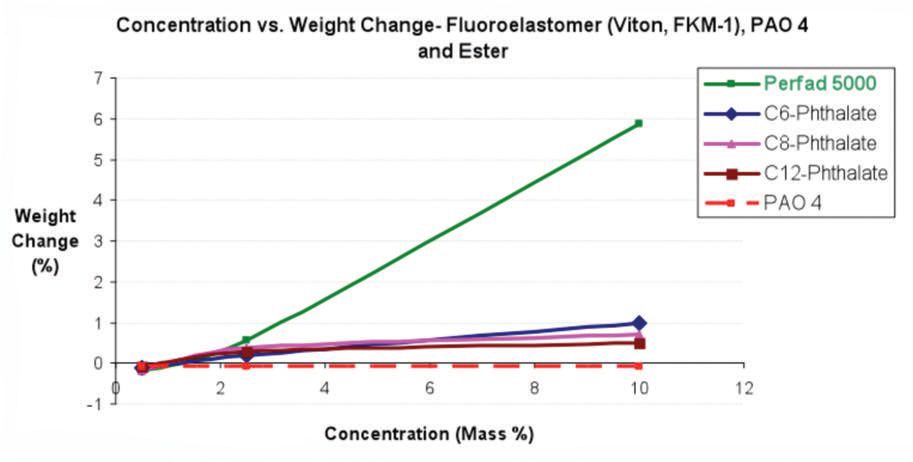 Figure 2. Concentration of Perfad 5000 in PAO 4 vs. weight change of Viton fluoroelastomer compared to phthalate esters.
Lubricity additives for metalworking fluids
Figure 2. Concentration of Perfad 5000 in PAO 4 vs. weight change of Viton fluoroelastomer compared to phthalate esters.
Lubricity additives for metalworking fluids
Croda continues to work on creating additives for metal working applications that improve tool life and extend the life of metalworking fluids. In 2012, Croda launched Perfad 8400, a new lubricity additive for metalworking fluids. It outperforms conventional esters currently used as additives in straight oils. Perfad 8400 boosts the lubrication properties of neat metalworking fluids, and it can act synergistically with chemically reactive compounds containing phosphorus to boost the performance level of the neat metalworking fluid (
Figure 3). Initial screening work also suggests that Perfad 8400 will also act synergistically with sulfur containing compounds. Perfad 8400 itself contains no phosphorus, sulfur or chlorine and is made solely of carbon, hydrogen and oxygen.
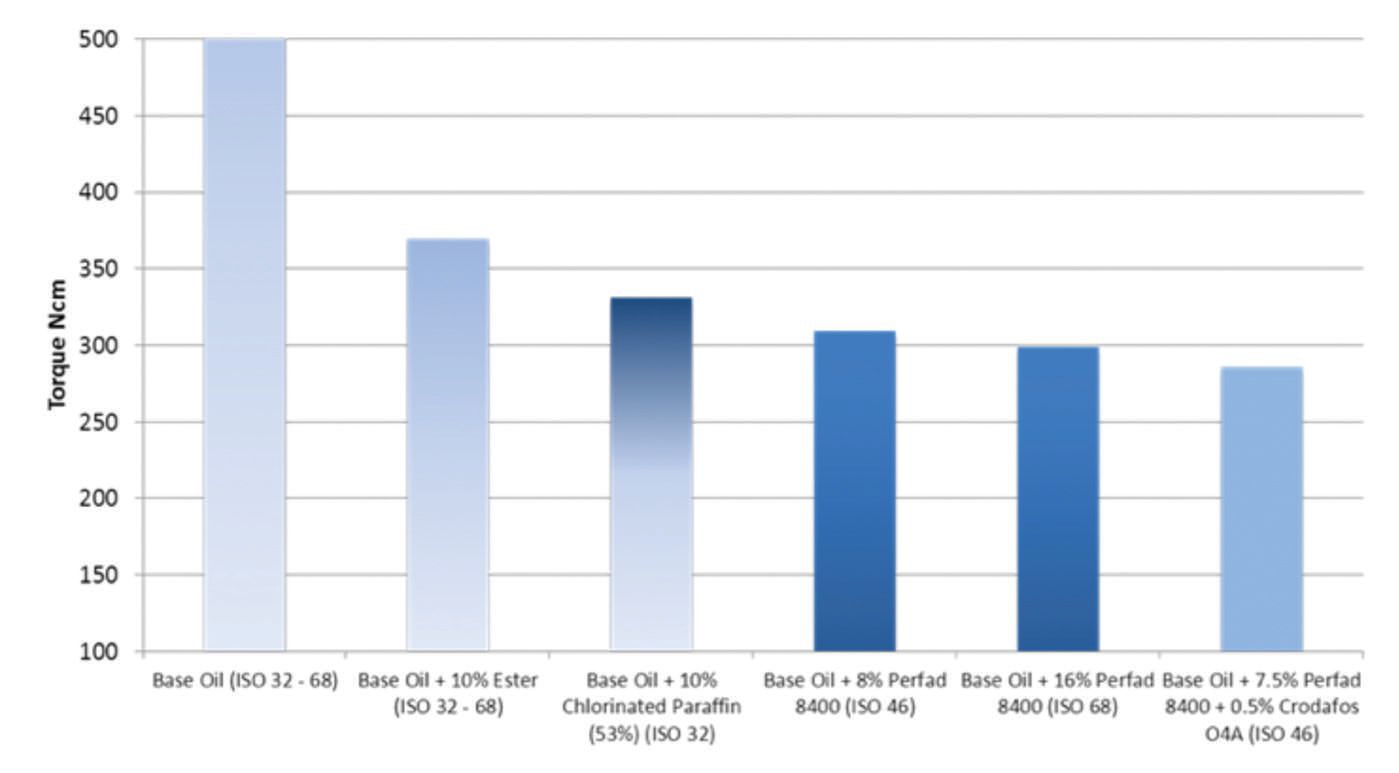 Figure 3. 6mm form tapping results on hard steel (1018). Perfad 8400 provided a 16-23% reduction in tor
Figure 3. 6mm form tapping results on hard steel (1018). Perfad 8400 provided a 16-23% reduction in torque.
In 2012, Croda launched Perfad 8100, an additive designed to improve the lubricity and performance of multi-metal stamping and drawing fluids. Perfad 8100 is a bio-based additive that allows formulators to replace chlorinated paraffin, which continue to receive close regulatory scrutiny. In addition, Perfad 8100 is easier to wash off of parts and tools compared to chlorinated products. In twist compression testing, Perfad 8100 performed comparably to a medium-chain chlorinated paraffin both on cold-rolled steel and aluminum.
New water-soluble corrosion inhibitor package
In May 2012, Croda launched Crodacor WS1, a new corrosion inhibitor package that provides excellent ferrous corrosion inhibition performance in water-based lubricants and has low foaming tendencies. Crodacor WS1 is a pre-neutralized liquid product, allowing formulators to minimize the handling of solids or hazardous amines. This can lead to a potential cost savings from removing a heating or a blending step. The product contains no nitriles, borates, secondary amines, phosphorous or sulfur and the active ingredient in the package is made from 100% renewable raw materials.
Figure 4 shows how Crodacor WS1 performed in the ASTM D4627 cast iron chip test. Crodacor WS1 performs as good as or better than the industry standard package. The picture on the right is the control where no corrosion inhibitor was used. Croda has also developed an in-house galvanic corrosion test. This type of corrosion takes place when two different metals come in contact with each other, mimicking field operations. We prepare cast iron chips similarly to those in ASTM D4627 but instead of placing them on paper, we put them on a metal coupon (
Figure 5). The right most result was the test sample with no corrosion inhibitor. Again, compared to the industry standard package for metalworking fluids, Crodacor WS1 performed as well or better.
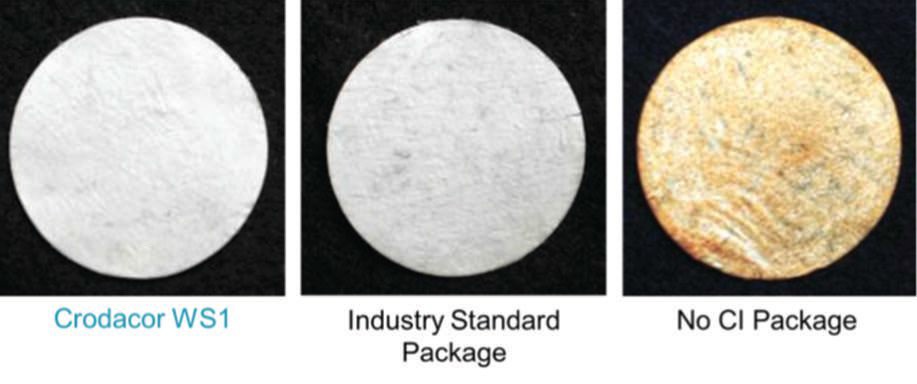 Figure 4. ASTM D4627 cast iron chip test. Crodacor WS1 out performs the industry leading corrosion inhibitor package.
Figure 4. ASTM D4627 cast iron chip test. Crodacor WS1 out performs the industry leading corrosion inhibitor package.
 Figure 5. Galvanic corrosion test results. Crodacor WS1 outperforms the industry leading corrosion inhibitor package.
Figure 5. Galvanic corrosion test results. Crodacor WS1 outperforms the industry leading corrosion inhibitor package.
When adding new materials to aqueous lubricants, one must ensure that the foam profile is not negatively affected. These results from a Waring blender test in
Figure 6 show that the initial foam produced by Crodacor WS1 is 40% less than the industry standard package. Not only is less foam produced initially, but that foam is less stable. The foam disappears in 115 seconds, vs. 140 seconds.
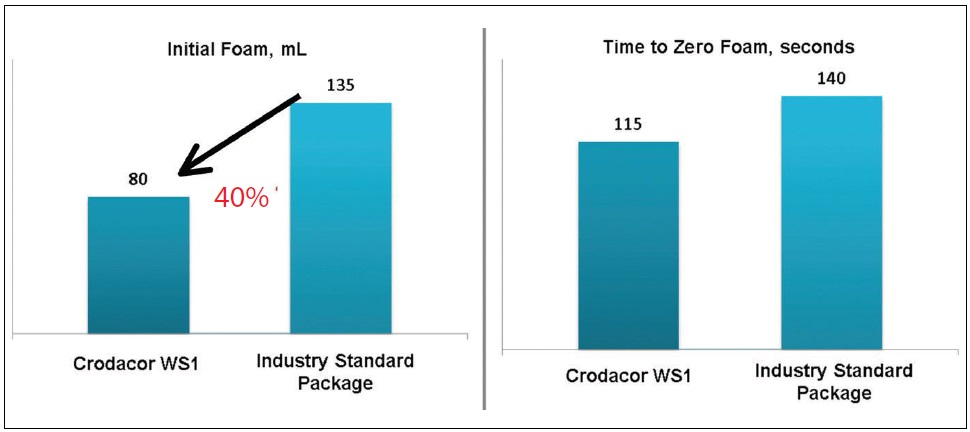 Figure 6. Crodacor WS1 vs. Industry Standard Package in a Waring Blender Test. 1.5% corrosion package in 100ppm water.
Figure 6. Crodacor WS1 vs. Industry Standard Package in a Waring Blender Test. 1.5% corrosion package in 100ppm water.